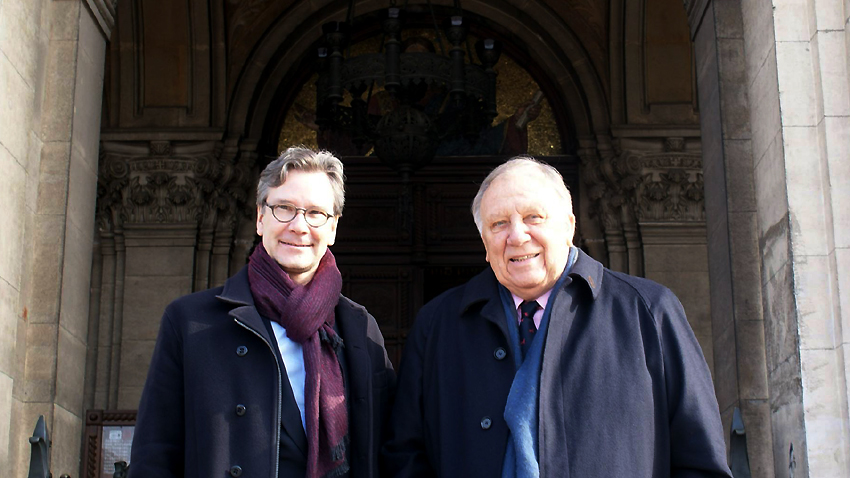The famous quotation of Graham Greene was the slogan of a compelling literary evening at the Sofia Sinagogue. Gregorij von Leitis and Michael Lahr read verses of a Nazi Germany concentration camp’s prisoners. The translation into Bulgarian had been trusted to students from Sofia high schools. The organizers wanted not only to remind of the past, but also to draw attention to the fact that life today is also full of hate speech. Vesela Vladkova spoke to both authors and to Valentin Pomakov, 12th grade, who had translated one of the poems.
 Von Leitis and Lahr came upon the verses by pure chance, in New York. They started to gather such works back in the 1980s, but the idea on literature readings across Europe was born after the assault on Charlie Hebdo, philosopher Lahr says:
Von Leitis and Lahr came upon the verses by pure chance, in New York. They started to gather such works back in the 1980s, but the idea on literature readings across Europe was born after the assault on Charlie Hebdo, philosopher Lahr says:
“The series of assaults is still continuing today. The second reason for our initiative is hate speech and the growing hatred towards minorities. I find it essential to show that hate is a lack of imagination. Just think how those artists opposed the hate of concentration camps with their verses, reflecting their imagination! Thus they prompted what we can do today – we shouldn’t give up or turn our heads away; we can counteract via beautiful art!”
Theatre expert von Leitis says that art is exactly that universal tool which can and must pass on to young people the ability to tell the difference between good and bad. “It’s not only the wallet that matters, we need food for our souls too,” says von Leitis, who was born during the war and a representative of the student protests’ generation of 1968 - an active participant in the rationalization of Germany’s Nazi past.
“Today’s youth is marvelous! Many of these young people are looking for answers, but can’t find them, as they don’t know where to search. I think that our literature program gives answers to them. The smart phone info is correct, but history can be reconsidered via some personal experience only. That is why our goal is to give them strength and the courage to voice their opinion to others, to speak up.”
Valentin Pomakov is a 12th grade student at one of Sofia’s German language high schools. At first he accepted the challenge to translate one of the verses due to personal reasons:
‘My experience with poetry is very humble. There was no way that I could resist the challenge to translate a verse instead of writing one. I have been studying German for many years and things couldn’t get more interesting, as the thing has been written in a very delicate manner and even with some irony and humor, taking into consideration the heavy subject. Of course that I see parallels with today’s world, but I try to ignore them, as I start feeling really tense.”
Michael Lahr lives in between Munich and New York and is alarmed to witness how racist words spoken from the highest political tribune of America and Europe are gradually turning into parlor speech.
“Politicians are now saying things which were considered unthinkable till recently. Furthermore – the masses begin to accept and like hate speech, thus opening the gates to racism. I hope that the current wave of protests against Donald Trump will establish new consciousness. I had hopes that it would happen during the Occupy movement, but alas – that didn’t happen,” Michael Lahr says in conclusion.
English version: Zhivko Stanchev
The traditional Bulgarian Christmas picnic, organized by the Bulgarian Cultural and Social Association "Rodina - Sydney" and the Bulgarian School "Dr. Petar Beron", will take place on December 8 , 2024 in St. Leonards Park in Sydney. "We have..
The Bulgarian national minority in Albania is one of the largest in the country, according to data from the latest official population census. A total of 7,057 individuals identified as Bulgarians. For comparison, 23,000 people identified as Greeks,..
From today, residents of Stara Zagora, young and old, can send their letter to Santa Claus. A letterbox has been set up in the foyer of the city's State Puppet Theatre to collect messages for Father Christmas. The cultural institution guarantees that..
According to the Annual Report on the Health Status of Bulgarian Citizens for 2023, t he main cause of death in Bulgaria is diseases of the..
At the Bulgarian Embassy in London, Prof. Bettany Hughes presented excerpts from the new BBC series - Wonders of Bulgaria. Prof. Bettany..
Over 3.5 million Ukrainians have arrived in or passed through Bulgaria since the beginning of the war. Nearly 200,000 people have found temporary..

+359 2 9336 661
